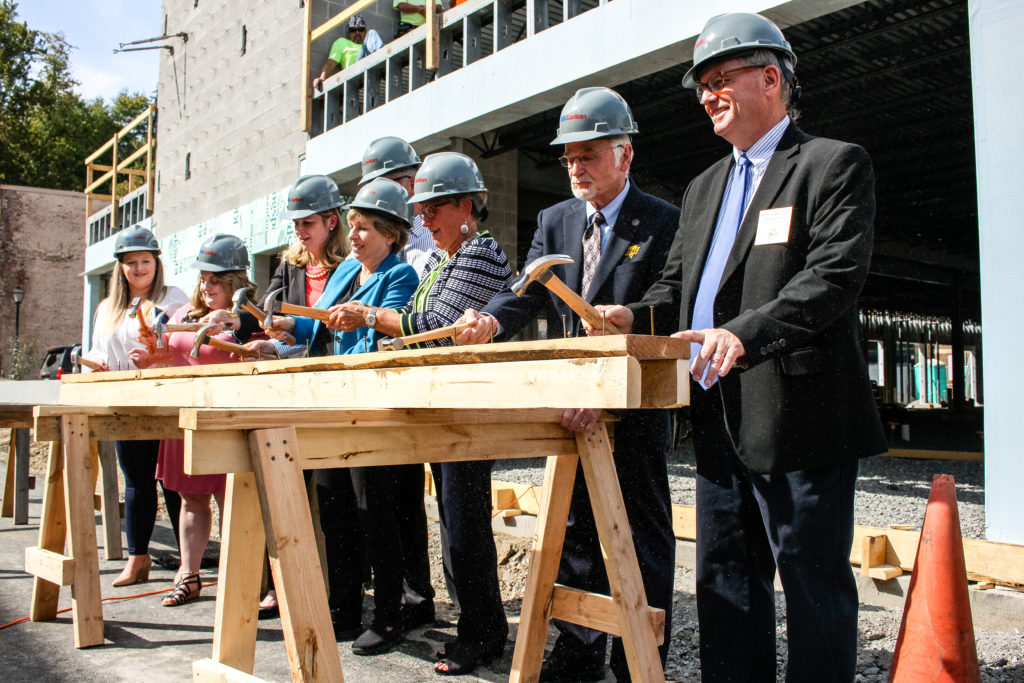By Randi Weingarten
When most of the coal companies pulled up stakes and abandoned McDowell County, WV, decades ago, they didn’t leave much behind except pain and poverty. Pride, however, remained. The good people of this part of rural America went from enjoying middle-class livelihoods to enduring sky-high unemployment, some of the nation’s worst health indicators, crushing drug abuse and family strife.
The toll on the community has impacted children in the county’s schools in particular. Eight years ago, nearly half of McDowell’s students didn’t live with their biological parents. Many didn’t have weather-appropriate clothing, access to medical or dental care or mental health services, books in their homes or access to the internet for homework. They were going to school cold, hungry and distracted.
Enter Reconnecting McDowell, an organization launched about a decade ago by the American Federation of Teachers (AFT) and former West Virginia First Lady Gayle Manchin, which has grown into a partnership of about 125 public and private entities, including unions, government agencies, lawmakers, corporations, nonprofit organizations and the people of McDowell County. The organization’s mission is to focus on making life better for the people of this community by reversing obstacles to progress in school, at work and in their neighborhoods.
Improvements can be found throughout the county, some obvious and some more subtle. Thanks to donated work, financial contributions and expertise provided by the partners, high-speed internet is now installed in the majority of schools and neighborhoods, and every student has access to medical, dental and mental health care. Schools have care closets so children in need of clothes, school supplies or toiletries can discreetly select what they need. There are mentoring programs in the two high schools, two elementary schools are now community schools providing an array of wraparound services, and others have a variety of recreational and extracurricular activities not available before. Schools are starting to become vibrant places of teaching and learning again—places where parents want to send their kids and where kids want to learn.
But a persistent challenge in McDowell is one that’s common in small towns around the country: the ability to attract and retain teachers. There is a chronic teacher vacancy problem, but not because teachers don’t want to teach in McDowell. It’s because the county lacks available, modern housing, requiring teachers and staff to live long distances from McDowell.
Members of Reconnecting McDowell care, fight and show up when it matters most. The union is a vehicle to fight for working families and solutions. Earlier this fall, the organization broke ground on Renaissance Village in Welch, WV, a 16-unit apartment building with commercial and community space. No longer will teachers have an hour-plus commute each way to work; they will be able to live closer to their schools and students’ families. The construction—with unionized workers—provides a long-overdue economic development spark in Welch, revitalizing Main Street in what will hopefully be the first of many projects.

Photo by Ronnie Lee Bailey.
“This is the first multistory construction project in the county in more than 50 years,” says Welch Mayor Harold McBride. “It’s such an unusual sight that people have been bringing over lawn chairs and watching the construction. It’s fantastic.”
According to Carolyn Falin, superintendent of McDowell County Public Schools, the work to overcome the consequences of poverty is making a difference. “Slowly but surely, we’re seeing progress. The high school graduation rate is over 90 percent, the drop-out rate is negligible, and academic performance is improving. We have a way to go, but we’re on the right track,” she says.
Small-town residents across the U.S. are discouraged that the American dream seems to be slipping out of their grasp. Recent elections show a widening gap between rural and urban America. Reconnecting McDowell’s projects, including Renaissance Village, reflect an investment in rural America that’s critical to bridge the divide happening in the U.S.
A recent poll by the AFT and the One Country Project found that more than 70 percent of rural voters say Main Street is in decline in small towns. Nearly half say their income is falling behind the cost of living, and all agree that towns suffer when a community’s main features, such as hospitals, post offices, grocery stores and other small shops, close. Small-town residents say they love their public schools and want greater investment in their communities’ roads, bridges and public schools.
Emily Hicks, a graduate of Mount View High School in McDowell County and Bluefield State College, is now teaching at Welch Elementary School. She credits Reconnecting McDowell’s mentoring program, Broader Horizons, for giving her the confidence and motivation to work hard. She says she may even rent a Renaissance Village apartment when it’s completed next year.
“Reconnecting McDowell made an incredible difference in my life,” she says. “I decided to stay in McDowell and pay it forward by becoming a teacher myself. I believe there will be a lot of interest to rent apartments at Renaissance Village so teachers can do their jobs, be part of students’ communities and not have to travel far to come home.”
Reconnecting McDowell is about the path to a better life. AFT’s work in McDowell and similarly in St. Lawrence County, NY, can spark efforts in other rural areas and small towns so young people like Hicks don’t move away and so businesses and policymakers that have abandoned these areas see reason to invest in them and fight for them.
About the Author
Randi Weingarten is the president of the American Federation of Teachers.








